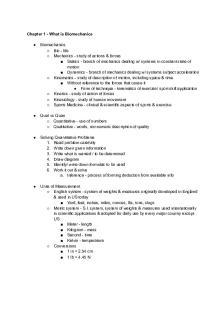Medsurgexam 1 - exam 1 study guide PDF

| Title | Medsurgexam 1 - exam 1 study guide |
|---|---|
| Author | tori hoefen |
| Course | Adult/Older Adult Hlth I |
| Institution | St. John Fisher College |
| Pages | 32 |
| File Size | 494.2 KB |
| File Type | |
| Total Downloads | 28 |
| Total Views | 120 |
Summary
exam 1 study guide
...
Description
Perioperative Nursing Perioperative Nursing: care that is provided before, during, and after surgery. Effective teaching and discharge planning prevent or minimize complications and ensure quality outcomes Surgical Setting - Ambulatory surgery: outpatient or same day - Purpose of surgery o Diagnose: determine the presence or extent of a disease (biopsy, paracentesis) o Cure: elimination of a pathologic condition, removal of gallbladder or ruptured appendix o Palliate: alleviation of symptoms without cure (back surgery) (radiation to shrink a tumor) o prevention: removal of a mole before it becomes malignant, removal of breasts for patient with the BRACA gene o explore: surgical examination to determine the nature or extent of a disease (often in the abdomen) o cosmetic improvement
Pre-operative Phase: know what type of surgery, educate to alleviate anxiety The most important aspect: assessment and interview Primary purpose: - obtain health information - provide info regarding surgery - assess patient’s readiness for surgery The Nurses Role - Have knowledge of the nature of the disorder requiring surgery. - Identify the individual patient’s response to the stress of surgery. - Assess the results of appropriate preoperative diagnostic tests.
o Make sure they are prepared for surgery physically, clotting / coagulation - Provide a baseline by identifying potential risks and complications. Metabolic panel (BMP/CMP)
CBC (WBC,RBC,Hgb,Hct)
Blood glucose
PT/INR, PTT, platelets
LFTs (liver function test)
Type and Screen/Crossmatc
Urinalysis
hCG
Chest X-ray
Pulmonary Function Test
Serum albumin
EKG
PT/INR, PTT: is your patient at risk for bleeding? CBC: blood supply, immune defense intactness Liver function tests: how is the liver doing? Type and screen/crossmatch: for surgeries with high risk of bleeding EKG: anything that is going on with conduction system that could affect the surgery and outcome Chest XRay: sometimes not always hCG: to know if they are pregnant pulmonary function test: for those that scmoke, have COPD Nursing Process: Assessment Assessment of patient themselves Knowledge of what is going on Psychological status - Stress level? - History of anxiety or depression?
Emotional Health - Body image alterations - Self concept and self esteem Cultural/ethnic factors - How will it impact a hospital stay? Physiologic factors that may contribute to operative risk factors - Any bleeding disorders? - Vital signs? Establish baseline data - Vital signs? - Lab results? Identify meds or herbs taken that may affect surgical outcome Medication history - Prescription - OTC - Herbs - Street drugs - Supplements - Anything can react with anesthesia!!! Allergies drugs, latex, food, contact - don’t want an adverse reaction from an allergic medicine Identify, document and share results of lab/diagnostic tests - Ask about occupation (*this will determine how the surgery will effect them returning to work) (*connect patient to social worker or someone else to help them if they need) Support sources - Family - Friends
- Home environment *do they have a ride home?! Smoking - Cigs? - Packs per day? - # of years? - Juul, ecig? - Smoking increased risk of heart disease, MI - Increased pulmonary problems: COPD, emphysema, poor oxygenation - Increased risk DVT Alcohol ingestion and substance use/abuse - How often? - Per day? - Per week? - Medicinal marijuana? Alcohol: most often malnourished or undernourished, higher risk for liver disease, portal hypertension, withdrawal, etc. Substance Use: may need higher amounts of anesthesia and pain medications Support: - Who is driving you home - What is home like Assessment of patients body systems Allergies...
Similar Free PDFs

Medsurgexam 1 - exam 1 study guide
- 32 Pages

Exam 1 Study Guide
- 1 Pages

exam 1 study guide
- 5 Pages

Exam 1 study guide
- 6 Pages

Exam 1 Study Guide
- 6 Pages

Exam 1 Study Guide
- 12 Pages

Study Guide Exam 1
- 9 Pages

EXAM 1 Study Guide
- 3 Pages

Exam 1 Study Guide
- 14 Pages

Exam 1 study guide
- 21 Pages

Exam 1 study guide
- 13 Pages

Study guide Exam 1
- 24 Pages

Exam 1 study guide
- 5 Pages

Exam 1 Study Guide
- 2 Pages

Exam 1 Study Guide
- 17 Pages

Exam 1 Study Guide
- 4 Pages
Popular Institutions
- Tinajero National High School - Annex
- Politeknik Caltex Riau
- Yokohama City University
- SGT University
- University of Al-Qadisiyah
- Divine Word College of Vigan
- Techniek College Rotterdam
- Universidade de Santiago
- Universiti Teknologi MARA Cawangan Johor Kampus Pasir Gudang
- Poltekkes Kemenkes Yogyakarta
- Baguio City National High School
- Colegio san marcos
- preparatoria uno
- Centro de Bachillerato Tecnológico Industrial y de Servicios No. 107
- Dalian Maritime University
- Quang Trung Secondary School
- Colegio Tecnológico en Informática
- Corporación Regional de Educación Superior
- Grupo CEDVA
- Dar Al Uloom University
- Centro de Estudios Preuniversitarios de la Universidad Nacional de Ingeniería
- 上智大学
- Aakash International School, Nuna Majara
- San Felipe Neri Catholic School
- Kang Chiao International School - New Taipei City
- Misamis Occidental National High School
- Institución Educativa Escuela Normal Juan Ladrilleros
- Kolehiyo ng Pantukan
- Batanes State College
- Instituto Continental
- Sekolah Menengah Kejuruan Kesehatan Kaltara (Tarakan)
- Colegio de La Inmaculada Concepcion - Cebu